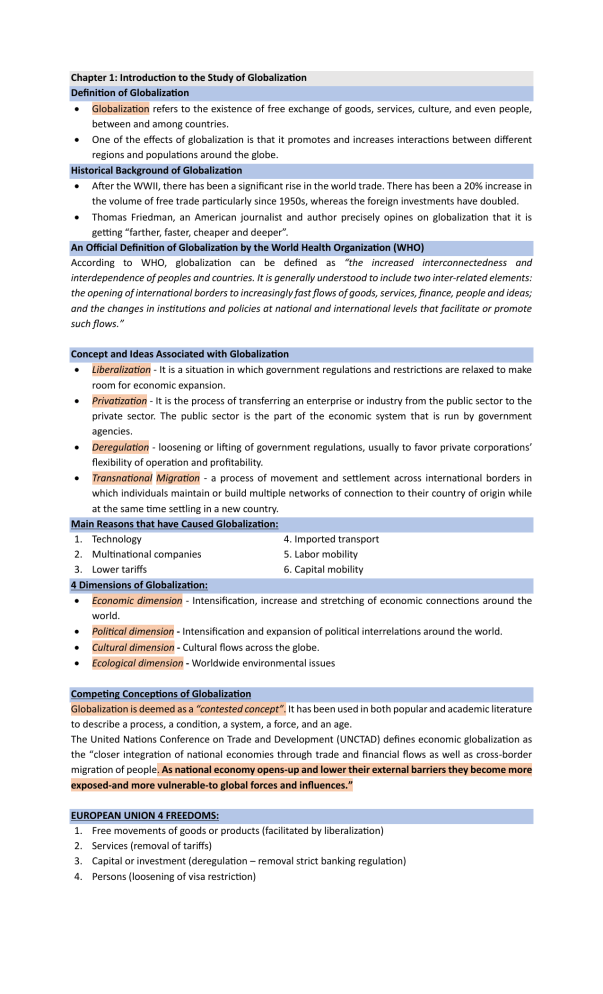
Chapter 1: Introduction to the Study of Globalization Definition of Globalization Globalization refers to the existence of free exchange of goods, services, culture, and even people, between and among countries. One of the effects of globalization is that it promotes and increases interactions between different regions and populations around the globe. Historical Background of Globalization After the WWII, there has been a significant rise in the world trade. There has been a 20% increase in the volume of free trade particularly since 1950s, whereas the foreign investments have doubled. Thomas Friedman, an American journalist and author precisely opines on globalization that it is getting “farther, faster, cheaper and deeper”. An Official Definition of Globalization by the World Health Organization (WHO) According to WHO, globalization can be defined as “the increased interconnectedness and interdependence of peoples and countries. It is generally understood to include two inter-related elements: the opening of international borders to increasingly fast flows of goods, services, finance, people and ideas; and the changes in institutions and policies at national and international levels that facilitate or promote such flows.” Concept and Ideas Associated with Globalization Liberalization - It is a situation in which government regulations and restrictions are relaxed to make room for economic expansion. Privatization - It is the process of transferring an enterprise or industry from the public sector to the private sector. The public sector is the part of the economic system that is run by government agencies. Deregulation - loosening or lifting of government regulations, usually to favor private corporations’ flexibility of operation and profitability. Transnational Migration - a process of movement and settlement across international borders in which individuals maintain or build multiple networks of connection to their country of origin while at the same time settling in a new country. Main Reasons that have Caused Globalization: 1. Technology 4. Imported transport 2. Multinational companies 5. Labor mobility 3. Lower tariffs 6. Capital mobility 4 Dimensions of Globalization: Economic dimension - Intensification, increase and stretching of economic connections around the world. Political dimension - Intensification and expansion of political interrelations around the world. Cultural dimension - Cultural flows across the globe. Ecological dimension - Worldwide environmental issues Competing Conceptions of Globalization Globalization is deemed as a “contested concept”. It has been used in both popular and academic literature to describe a process, a condition, a system, a force, and an age. The United Nations Conference on Trade and Development (UNCTAD) defines economic globalization as the “closer integration of national economies through trade and financial flows as well as cross-border migration of people. As national economy opens-up and lower their external barriers they become more exposed-and more vulnerable-to global forces and influences.” EUROPEAN UNION 4 FREEDOMS: 1. Free movements of goods or products (facilitated by liberalization) 2. Services (removal of tariffs) 3. Capital or investment (deregulation – removal strict banking regulation) 4. Persons (loosening of visa restriction) “Globalization as a “long term process”. General Agreement on Tariffs and Trade (GATT) Formally supplanted by World Trade Organization (WTO) on 1995 through Marrakesh Agreement. WTO describe as the only global international organization dealing with the rules of trade between nations. Thomas Friedman’s best-selling book The Lexus and the Olive Tree, gives definition of globalization as “not static, but dynamic ongoing process” Globalization as “the process by which the world is becoming increasingly interconnected” (British Broadcasting Corporation) Philosophies/Ideologies of/on/against Globalization Keynesianism (reformist) - Markets are good. However, they are not perfect. Government must intervene to correct market failures. Neoliberalism (laissez-faire) - The world is best served by free markets. Government intervention is not permitted. 6 Ideological Claims 1. Globalization is about the liberalization and global integration of markets. 2. Globalization is inevitable and irreversible. 3. Nobody is in charge of globalization. 4. Globalization benefits everyone. 5. Globalization furthers the spread of democracy in the world. 6. Globalization requires war on terror. Critics of Globalization Anti-globalization - wants an end to what it considers as a highly imbalanced system of globalization that favors the developed countries over the developing countries Alter-globalization - favors ‘altering’ or ‘changing’ the current system of globalization to make it more humane; more pro-environment; and grass-roots driven rather than saying as a top-down imposition Positive Aspects of Globalization Multiculturalism and multilingualism ● Migration Free Trade ● Global Cooperation Cultural and Educational Exchanges Negative Aspects of Globalization Linguistic Hegemony of English ● Global Income and Wealth Inequality Cultural Homogenization ● Tax Injustice Third World dependence on the First World ● Racism and Anti-migrant sentiment 5 Scapes of Globalization by Arjun Appadurai 1. Ethnoscape - global movement of people 2. Mediascape - flow of media 3. Technoscape - circulation of mechanical goods and software 4. Financescape - global circulation of money 5. Ideoscape – the realm where political ideas move around





